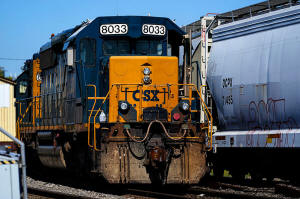CSX railroad profit slips 2% as shipping demand remained weak and
severance costs hurt results
[January 23, 2026] By
JOSH FUNK
CSX said Thursday that its profit slipped 2% in the fourth quarter as
the railroad dealt with weak demand and severance costs from layoffs
that new CEO Steve Angel carried out last fall.
The Jacksonville, Florida-based railroad said it earned $720 million, or
39 cents per share, in the quarter. That's down from $733 million, or 38
cents per share.
But the results were weighed down by about $50 million in one-time costs
that drug down profits by 2 cents per share. Without that, the numbers
would have been inline with the 41 cents per share that the analysts
surveyed by FactSet Research had predicted.
“This has been a challenging year for CSX and for our industry overall,
with subdued demand and limited growth opportunities,” CEO Steve Angel
said. CSX said its revenue slipped 1% to $3.51 billion in the quarter.
The competitive landscape in the railroad business could change
drastically in the next few years if Union Pacific's proposed $85
billion acquisition of Norfolk Southern is approved. But Angel said he
isn't too worried about that yet because the Surface Transportation
Board's formal review of the deal hasn't even started.
Most observers believe CSX and BNSF will be at a competitive
disadvantage if that merger is approved. That new transcontinental
railroad would control nearly half of all freight and could shave more
than a day off delivery times because it won’t have to hand off
shipments between railroads in the middle of the country. At this point,
CSX and BNSF are focused on improving their delivery times through
cooperative agreements instead of a merger.

[to top of second column] |

A CSX train engine sits idle on tracks in Philadelphia, Sept. 14,
2022. (AP Photo/Matt Rourke, File)
 Heading into 2026, CSX is working on
improving productivity while limiting costs. But Angel said he
expects only modest economic growth this year amid all the
uncertainty. He predicted that CSX will see revenue grow only by low
single digits, and the railroad pulled its targets for 2027 that it
had established a couple of years ago.
“The focus is just making sure that we can be as competitive as we
can. But at the end of the day, we can create value by running CSX
better every day,” Angel said.
Last fall CSX wrapped up the two major construction projects that
disrupted its network and limited the railroad’s flexibility. CSX
completed a major tunnel renovation in Baltimore and repairs from
Hurricane Helene. That helped raise its trains' average speed to
19.6 mph in the fourth quarter while delivering 87% of its shipments
on time.
The tunnel project will allow CSX to begin hauling metal shipping
containers filled with assorted goods stacked two high across its
network this year. But competitor Norfolk Southern announced a
similar double-stacked service in the east earlier this week.
CSX is one of the largest railroads in North America, operating in
the eastern United States.
All contents © copyright 2026 Associated Press. All rights reserved |